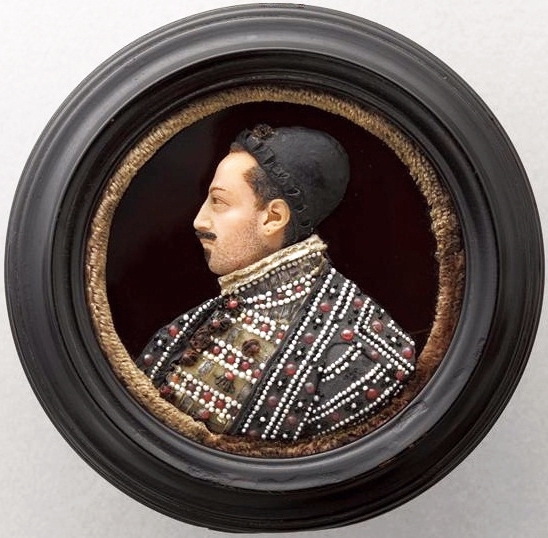|
Antonio Abondio
Antonio Abondio (1538–1591) was an Italian sculptor, best known as a medallist and as the pioneer of the coloured wax relief portrait miniature. Born in Riva del Garda, he was trained by Leone Leoni and worked in Italy between 1552 and 1565. Thereafter he mainly worked for the Habsburgs, with a few works made for French and Polish kings. He moved to Vienna to the court of Emperor Maximilian I and after his death in 1576 to Prague. He travelled to France, Netherlands and Germany. He died at Vienna in 1591. His son Alessandro followed in his father's footsteps, also specializing in mythological and portrait reliefs, and marrying the widow of another court artist, Hans von Aachen. Work Thirteen of Abondio's wax portraits survive, usually made on a round black slate base, decorated with tiny pearls and precious stones. He made about sixty portrait medals, with a portrait on the obverse and an allegory on the reverse side, some of them have silver enamelled framing. He also mad ... [...More Info...] [...Related Items...] OR: [Wikipedia] [Google] [Baidu] [Amazon] |
Coin
A coin is a small object, usually round and flat, used primarily as a medium of exchange or legal tender. They are standardized in weight, and produced in large quantities at a mint in order to facilitate trade. They are most often issued by a government. Coins often have images, numerals, or text on them. The faces of coins or medals are sometimes called the ''obverse'' and the ''reverse'', referring to the front and back sides, respectively. The obverse of a coin is commonly called ''heads'', because it often depicts the head of a prominent person, and the reverse is known as ''tails''. The first metal coins – invented in the ancient Greek world and disseminated during the Hellenistic period – were precious metal–based, and were invented in order to simplify and regularize the task of measuring and weighing bullion (bulk metal) carried around for the purpose of transactions. They carried their value within the coins themselves, but the stampings also induced manip ... [...More Info...] [...Related Items...] OR: [Wikipedia] [Google] [Baidu] [Amazon] |
16th-century Italian Sculptors
The 16th century began with the Julian year 1501 (represented by the Roman numerals MDI) and ended with either the Julian or the Gregorian year 1600 (MDC), depending on the reckoning used (the Gregorian calendar introduced a lapse of 10 days in October 1582). The Renaissance in Italy and Europe saw the emergence of important artists, authors and scientists, and led to the foundation of important subjects which include accounting and political science. Copernicus proposed the heliocentric universe, which was met with strong resistance, and Tycho Brahe refuted the theory of celestial spheres through observational measurement of the 1572 appearance of a Milky Way supernova. These events directly challenged the long-held notion of an immutable universe supported by Ptolemy and Aristotle, and led to major revolutions in astronomy and science. Galileo Galilei became a champion of the new sciences, invented the first thermometer and made substantial contributions in the fields of ph ... [...More Info...] [...Related Items...] OR: [Wikipedia] [Google] [Baidu] [Amazon] |
Italian Goldsmiths
Italian(s) may refer to: * Anything of, from, or related to the people of Italy over the centuries ** Italians, a Romance ethnic group related to or simply a citizen of the Italian Republic or Italian Kingdom ** Italian language, a Romance language *** Regional Italian, regional variants of the Italian language ** Languages of Italy, languages and dialects spoken in Italy ** Italian culture, cultural features of Italy ** Italian cuisine, traditional foods ** Folklore of Italy, the folklore and urban legends of Italy ** Mythology of Italy, traditional religion and beliefs Other uses * Italian dressing, a vinaigrette-type salad dressing or marination * Italian or Italian-A, alternative names for the Ping-Pong virus, an extinct computer virus * ''Italien'' (magazine), pro-Fascist magazine in Germany between 1927 and 1944 See also * * * Italia (other) * Italic (other) * Italo (other) * The Italian (other) * Italian people (other) Italian ... [...More Info...] [...Related Items...] OR: [Wikipedia] [Google] [Baidu] [Amazon] |


